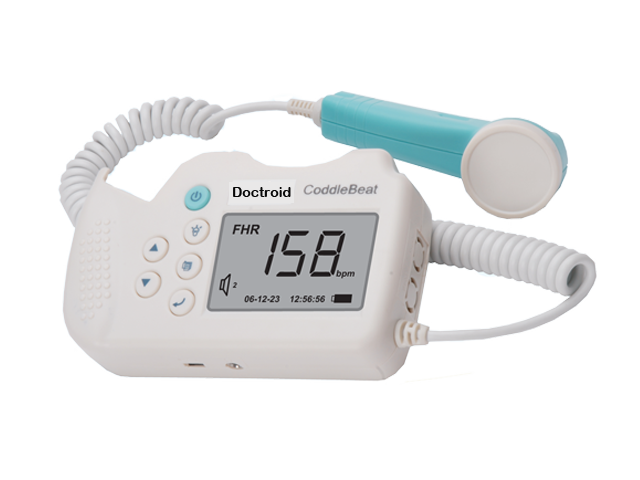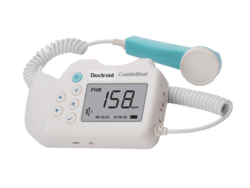Fetal Doppler
- High Quality Fetal Doppler.
- 2 MHZ Probe
- LCD display with Backlight
- High sensitive transducer
- Inbuilt rechargeable Li-ion battery
A fetal Doppler is a medical device used to monitor the heartbeat of a developing fetus in the womb. It is a non-invasive and safe tool commonly used by healthcare professionals, such as obstetricians and midwives, during prenatal check-ups. Fetal Dopplers use a technology called Doppler ultrasound to detect and amplify the sound of fetal heartbeats, allowing healthcare providers to listen to the baby’s heart rate and assess its overall well-being.
Here’s how a fetal Doppler typically works:
- Ultrasound waves: The device emits high-frequency sound waves (ultrasound) through a probe or transducer. These waves are harmless to both the mother and the fetus.
- Sound waves bounce back: When the ultrasound waves encounter moving objects, such as blood flow, they bounce back to the device.
- Signal processing: The Doppler device processes the returning sound waves and amplifies them, making them audible through a built-in speaker or by transmitting them to an external device for listening.
- Heartbeat detection: Healthcare providers use the Doppler to locate and monitor the fetal heartbeat. The sound of the heartbeat is distinctive and can be differentiated from other sounds, such as the mother’s own heartbeat or background noise.
Fetal Doppler monitoring is a valuable tool during pregnancy for various reasons:
- Confirmation of pregnancy: Hearing the fetal heartbeat is often the first clear sign of a viable pregnancy.
- Monitoring fetal well-being: Regular monitoring of the fetal heartbeat helps assess the baby’s health and detect any potential issues.
- Bonding: Listening to the baby’s heartbeat can be a meaningful experience for expectant parents, allowing them to connect with their unborn child.
It’s important to note that while fetal Dopplers are available for home use, their use without proper training or guidance from a healthcare professional can lead to unnecessary stress or misinterpretation of the baby’s well-being. Therefore, it is recommended that pregnant individuals consult with their healthcare provider for proper guidance on using fetal Dopplers and for regular prenatal check-ups to ensure the health of the fetus.
Be the first to review “Fetal Doppler” Cancel reply
Related products
Other Equipment
Other Equipment












Reviews
There are no reviews yet.